The Challenge of Climate Change. The Kyoto Protocol Through the Eyes of The Swedish Youth
Private consumption is to a large extent the ultimate driving force for green house emissions. Will the private individuals face a reduction in standard of living as a result from economic losses generated by the Kyoto Protocol? Will it be possible to choose less CO2-intensive products for consumption and minimizing other activities leading to increase green house gas production? New values and consumption patterns are emerging among the young starting to help in reducing the 'personal green house burden' but will this be enough? And further more; will it be possible to take active part without profound changes in the quality of life issues valued in today's society? In short: is there a willingness to transform attitudes into action?
To be able to answer these questions with a foresighted perspective there is a need for a deeper understanding of especially the young peoples value patterns and belief systems. And to judge the nature of the differences between values and active life. However, in the short hand there is also a profound impact made by the aging baby boomers. The consumers decisions whether we are talking about the ''Gray Dawn's' or the young ones will push the companies to take action as well. As a matter of fact this is already happen. Thus it is important to take the individual perspective as well as the company perspective into consideration when analyzing the effects of the Citizens on the outcome of the Kyoto Protocol
There has been a new divider of environmental and energy interests in society. Earlier the companies generally took the opposite standpoint as to the young generation which were dominated by a profound environmental interest. And the politicians were sort of "passing the question". At the Kyoto conference in December 1997 something happened, or at least something became visible: the young ones and the energy industry shared a common interest in getting long run decisions and pushed for results - while the politicians were hopelessly backbound by shortsighted interests.
The agreement reached at the Kyoto conference called for an overall reduction of greenhouse gas emissions by developed countries of at least 5.2% by 2008-2012 compared to 1990. Targets were not able to set for developing countries. The agreement made provision for the meeting of targets through a range of measures including market based mechanisms (e.g. trading of emission credits)
Uncertainties as to the extent, nature and speed of climate change could be debated. Some are reticent to reduce greenhouse gas emissions until the situation becomes clearer, some take decisive action now. That goes for countries as well as companies and individuals. Most people and institutions seem to be doubtful about the possibilities. It is the role of governments to set the policy frameworks that will help deal with the climate change issue. Many other groups, including business, also have a role to play. The long-term solution lies in international co-operation, which should take into account the needs of both industrialized nations, and developing countries that want more energy at an affordable price. This is obvious but what are the odds?
Patrick J Michael who is a well-known researcher in Environmental Science disappointedly called the Kyoto Protocol "a useless appendage to an irrelevant treaty" when testimoning to the US House of Representatives in Washington DC in July 1998. He stated that the Kyoto Protocol would have no discernable impact on global climate within any reasonable policy framework. And he has not been alone in that judgement (note)
The responsibility of the energy industry
On the other hand the shared interests by the young and the industry has already proven to give some results. Companies like the Shell Group - with a long tradition of working with scenarios about the future - has already decided that by 2002, their greenhouse gas emissions will be cut by more than 10 percent of their 1990 levels - beyond the levels agreed by the world's industrialized countries at the Kyoto conference.
In September 1999, within two years from Kyoto, the company decided to get out of the coal business after more than two decades of investing in it. Since coal is by far the most carbon-intensive fossil fuel: it releases 29% more carbon per unit of energy than oil, and 80% more than natural gas, this decision can be seen as a direct effect of Kyoto. Thus a commitment like the Kyoto Protocol directly affects the companies business-plans and future strategies. The flexible economic mechanisms agreed in Kyoto Protocol can, if designed and operated according to market principle, help to achieve the aims and to minimize the overall costs to society of reducing greenhouse gas emissions, argues the company, which has "Living by our values" as there slogan. But there is a long history behind...
Earlier there was a clear polarization between economic growth and environmental issues. More environmental quality meant less economic growth, and vice versa. And development was expressed in GNP, which essentially measures the volume of monetary transactions, regardless of what is traded. It includes a lot of things we would rather have less of (pollution, road accidents, etc) and excludes the value produced by unpaid work (household, childcare etc) and the free services of the environment. This is a point frequently pointed at by the greens.
Since the 1960s and 1970s things have changed quite considerably. At that time one of the main problem was to even get the ecological questions on to the agenda at all. Now the value of 'ecology' is ranking alongside other concepts like 'freedom' and 'democracy' as an unquestionable good. Controversy has transformed into constructive dialogue. This was obvious on site in Kyoto, but can hardly be understood by reading the documents. Therefore it is of valuable interest to get the answers directly from the consumers and producers, not just through negotiated texts. The success depends on demonstrating how ecological concern coincides with economic interest. Our common goal is of course to maximize well-being and human welfare. Earlier this was measured by economic growth and the quantity of goods consumed but now in a networked economy the preconditions of human flourishing in non-economy sense, by highlighting the importance of arts, culture, science and values is of increasing importance'
The perception of what constitutes an asset and what it is that creates wealth is shifting dramatically. Intellectual capital is becoming relatively more important than physical capital. Indeed, the new source of wealth is not material, it is information, knowledge applied to work to create value. "The pursuit of wealth is now largely the pursuit of information, and the application of information to the means of production" says former Citibank Director Walter Wriston. This means that the parts of the energy business that understands the basics of the new networked economy will share interests with the young generation and the ecology movements, or as Leon Martel expressed it "Information is rapidly replacing energy as society's main transforming resource" .To that we could ad the new understanding of branding through ethics. Core values and image means a lot for the business driven actions. Whether you are a business to Consumer or a business to Business Company you have to consider the voices of the end user. And if your time perspective is wide enough (which is wise in a rapidly transforming world) you got to focus on young people's values and belief systems.
The Nineties Report is, in the real sense of the word, a unique survey whose purpose is to provide in-depth information about and understanding of the thoughts and values of the young generation – tomorrow's adults. It deals with major future issues in general, with special emphasis on work, technology, communications, mobility and energy and the environmental.
A group of young people, specially trained in the theory and method of futures studies, traveled all over Sweden and conducted interviews with their peers aged 19-25, at home, at school and elsewhere. A precise selection method was used to ensure that the interviewees constituted a representative sample of young people. They have been visited and revisited during a five-year period. In order to assure the validity of the findings and avoid any "interview effects" resulting from the repeated meetings, extensive questionnaire surveys have been carried out by means of telephone and postal interviews. Altogether, several thousand young people have been interviewed. The results have been analyzed and processed in several different ways and the material has been critically examined on strictly scientific grounds. People's values are a powerful influence that not only shapes individual lives but also consumer behavior, politics and fashion. The values that are established in youth are very durable. They are, as it were, a sounding board or a frame of reference that we carry with us to the end of our lives. Obviously, people change over time, and we are also shaped to a large extent by the society we grow up in. The project studies both life cycles and generation and periodical effects, i.e. changes in values over time and due to specific events.
The potential benefit of being able to understand and interpret young people's thoughts and values is enormous. They are the key to new lifestyles and a fresh attitude to work and relationships, but they also identify the driving forces behind change. This should increase understanding between the decision-making generation and the younger generation. We must make the most of the young as a creative resource, both as consumers and fellow human beings. Understanding values is one of the most important success factors. Thus, when trying to measure and analyze to what extent the Kyoto Protocol will result in a changed consumer behavior the young are a key group to focus on.
Why specifically ask the young, isn't all ages equally of importance? This is obviously a crucial issue. The young are the future. Demographic factors are inevitably increasing the power of the young, while their elder's fade. Already the young wield enormous consumer power. We know that their values are strongly held and enduring. It is reasonable to assume that the views of the present young generation will dominate at least the next 30-40 years. During that period the outcome of the wanted actions considering the Kyoto Protocol will be enforced.
Values and attitudes is not the same thing, although they are often confused. Attitudes are more concrete, values more general. Attitudes change easily and rapidly, while values evolve gradually. These "sounding boards" are often the starting-point for later attitudes and market behavior. If we were able to react as soon as we became aware of people's values, this would have given us that all-important edge.
Values may be compared with natural forces, like waves in the open sea, while attitudes are like ripples on the surface of the water. If, for example, an enterprise, a political system or a town is unable to keep pace with these movements, the passive, often diffuse resistance will become too great, and sooner or later the powers that be will have to surrender, perhaps without really understanding why. On the other hand, attitudes that are based on deeper value patterns may derive unexpected support and power from them.
Values are a very powerful influence which, unfortunately, is seldom put to advantage by decision-makers and social architects. The importance of values is, moreover, increasing as a result of the changes that are taking place in society. We are now passing through a dangerous transitional phase in which new international groupings have not succeeded in establishing the necessary security. Many things that used to be taken for granted are losing their significance. Infrastructures that previously held society together (transport, energy and communication systems) are changing, and time concepts and production are being transformed, not only on account of the use of new materials and production methods, but just as much on account of developments in service provision. These unprecedented technological processes necessitate a completely new kind of education and training and completely new value patterns among individuals, enterprises and public institutions alike. This is why it is so important to try to understand young people's values and perceptions of the future. For example, how come nine out of ten young people say they are optimistic about the future?
Not a few young people in Europe are unemployed and live on welfare, they want to have fun, to be hip and drugs and crimes are proliferating. These are some of the ideas about what it is like to be young, but young people's own descriptions of youth are very different from those often projected by the media. Nine out of ten young people say they are optimistic about the future, and when they say that it usually goes for their own future too. 92 per cent of the respondents answered yes to the question "Do you think that you will be able to influence your own future?" In their opinion, people today can decide about their own lives to a large extent. They decide how they want to live. It is their own responsibility and they are usually willing to take the blame if things do not turn out as they expected. There is no significant difference between men and women as regards their attitudes to the future.
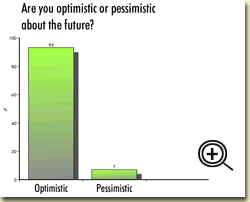 | 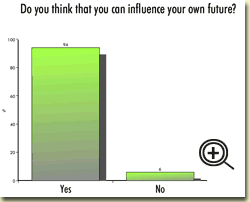 |
However, this vibrant optimism evaporates when they answer the slightly more general question "Do you think that you will be able to influence the future of your country?" The attitude of a significant majority is one of resignation. Few respondents think that they have any real influence over the behavior of politicians and the issues facing the national state as a whole. This apparent contradiction between their perception of themselves as individuals and as cogs in the social wheel is a recurring theme of the interviews conducted with Swedish youth and with pilots done in many other European countries.
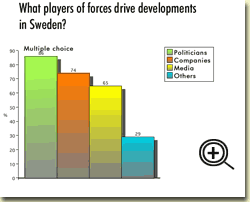 | 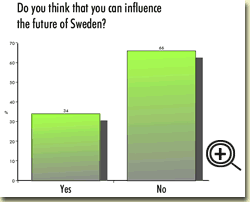 |
Their ideas about the future are often balanced, despite the optimistic undertone: "Things will work out as long as we have our family and social network to fall back on, as long as we are responsible and help each other". It is also quite clear that they make a distinction between their own future and the future of others, of society and of the world as a whole: "I believe in my own future, but I am not optimistic about the world and the environment." "I believe in my own future, but I am not confident about other people's future –segregation will increase"; "I believe in my own future, but I mistrust the politicians' system of governance" are some pros and cons that are frequently heard.
There are various expressions of this apparent dualism between the individual and society, not least in views on energy and the environment. The young do not anticipate energy shortages, nor do they believe that their own physical environment is under threat. But they are less confident when it comes to the national and global levels which is the concern of the Kyoto Protocol.
The young are a mobile generation. They tend to think globally and they are not afraid of new approaches. This is a generation brought up on the media and, as they themselves point out, their main sources of information are the radio, television, newspapers and the Internet.
30 years ago the chants of demonstrators on the march echoed in the streets of Helsinki, Stockholm, Paris and other cities in the western world. The newspapers were full of reports of flying bricks, water cannon and police batons. The young wanted to change the world. Each period has its value patterns. Today, things are very different. The young still want change, but their tactics are different. Politicians no longer lose any sleep for fear of new student riots. On the other hand, they have every reason to worry about the fact that young people today have turned their backs on politics. The respondents are unambiguous when it comes to answering the questions about their opportunities for influencing the future: there is no point in even trying to influence politicians, who are considered complacent and unable to see beyond the next election. Young people place greater faith in business, which they take altogether more seriously.
Today's youth are sometimes referred to as the MTV generation. They grew up in a society in which the media loom larger by the day. Information spreads fast and is easily accessible. Some even complain that it is difficult to get away from the never-ceasing flow of information. Many are confident that the media will help when it comes to exercising influence and bringing about change. But you can never really rely on the media. Young people also believe it is possible to influence business, either by one's buying habits or by other kinds of pressure. Three out of four respondents feel that companies accept responsibility for the market. Many say that companies, which do not realize this, will not survive. One of the interviewees, a cashier in a supermarket in Kristianstad in southern Sweden, was angry about the non-degradable aluminum foil used by a leading chocolate manufacturer in its packaging. She wrote a letter to the company, and this had the desired result. This sensitivity to the market is appreciated by young people, in contrast to the less agile political systems.
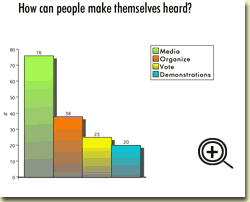 | 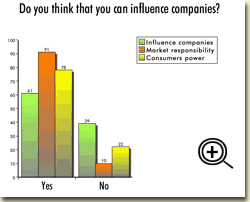 |
Although they do not generally believe that they will be able to influence Sweden's future, many young people nevertheless express a strong desire to do so. Unemployment and pollution must be combated, as must violence and racism. There is clearly a correlation between educational background and the perception that it is possible to bring about change. Only one out of five young people with a minimum of theoretical education believe this, while half of those with a theoretical education agree that change is possible.
The young of today are a generation that grew up with package tours and interrail. After leaving school many young people take off on a long journey and end up snorkeling in Malaysia, picking apples in New Zealand or backpacking among Maya temples in Mexico. Others become exchange students or go abroad as au pairs. This travelling generation, who take in the whole wide world via the media and who learned in their early science lessons to "act locally but think globally", have a natural feeling for the world that earlier generations never had. National boundaries have become blurred, and the distance to the far corners of the globe is measured in terms of the flying time from the nearest international airport rather than the weeks and months it used to take to travel round the Cape of Good Hope.
Consequently, most young people find it quite natural to think about living abroad. Many even see this as a first step to emigration. Information technology has probably played a part in this; after all, with the Internet and e-mail national boundaries have lost their meaning. The same percentage of respondents are optimistic about the future as about IT (90%). They are, by and large, the same people and they all have access to a computer.
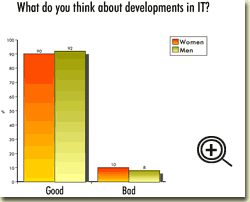 |  |
The 10 per cent of respondents who are pessimistic about the future are also negative to IT. There are no significant gender differences, young women share the young men's optimism. But fewer young women use a computer on a daily basis. We asked respondents to rank mobile phones, computers and driving licensees in order of preference. Having followed this generation for a number of years, we have seen their preferences change over time: the youngest rank mobile phones highest, after a few years they prefer computers, and by the age of 25-29 they consider driving licensees by far the most important of these attributes. At that age many of them have settled down and have a family, and mobile phones and computers are taken for granted as essential tools for living.
Four out of five respondents could imagine themselves starting a company. They like the idea of working in networks, but freedom and personal responsibility are important factors. However, practically no-one mentions money or a career as a reason to start a company. "The ultimate nightmare would be to end up in a long corridor with rows of locked doors, with you sitting behind one of them", says one respondent when discussing working life. The young regard the family and relationships as the most important thing in life. It must be possible to combine work and family life, and the most important thing at work, apart from the pay and stimulating tasks, is your workmates.
To the young of today, besides a more general "quality of life/ relation" concept the environment, mobility and information technology are the three main issues of the future. That does not necessarily mean that these issues are connected. A mobile lifestyle generally makes a greater impact on the environment, but according to the respondents the solution is not to stop travelling but to encourage technological development and shoulder more responsibility. Why should it not be possible to achieve the same intensive development in environment and transport as in IT, several respondents asked themselves.
When it comes to the consequences of global warming young people argue that even though it is not yet clear how, and to what extent, global warming will Effect the everyday lives of people around the world we have to take precautions and act now. It is a question of responsibility for the futures generation and the Earth.
What, then, are the most serious environmental problems of today? Various emissions into air and water, according to most respondents. Emissions of carbon dioxide and the greenhouse effect are mentioned by almost everybody, as are other atmospheric changes such as the ozone hole. Apart from these risks, our energy-wasting lifestyle is frequently mentioned as a threat. One young Swede in ten regards nuclear energy as an environmental problem. Forest destruction is mentioned by a few in the context of Sweden, but this is generally regarded as a much greater global problem than a national one. Alongside carbon dioxide emissions, the greenhouse effect and other emissions, the destruction of the forests ranks as the most serious environmental problem of all.
The solutions offered by the respondents are many and various. Technological advances are regarded as crucial, in particular for the purpose of treating emissions, but also of developing renewable energy sources. Stricter legislation and education are regarded as essential measures, both for Sweden and for the world.
Talking is one thing, but doing is another. And the study reveals significant gender differences in this connection. Young women are generally better at practicing what they preach. They separate their waste, they are more environmentally conscious as shoppers and they are keener about the work of environmental organizations, while young men tend to pin their hopes on technological advances. Furthermore, the boys have more faith in the government's ability to support pro-environmental efforts by legislative means. Young people make no distinction between their own responsibility and the responsibility of organizations, and they accept the same responsibility in this respect as companies and public authorities. But changes must not be too radical:
- I am prepared to modify some aspects of my lifestyle, but I'm not about to give it up altogether, is a comment that frequently crops up. Many young people also argue the need for a concerted effort: "the others must make changes too. I don't want to be the only one to separate my garbage. Everybody should have to do it".
- I know my lifestyle guzzles energy. I want to travel, I want to use the new technology, and I want to live in town. And I'm not prepared to sacrifice these things if I can help it. I think it's up to the energy companies to develop energy systems that are economical, says Petra, 24, one of the participants in the study.
There is a great thirst for knowledge when it comes to energy issues. Three respondents out of four consider that they know too little and would like to know more. Their information comes mostly from the media (59%) and school (28%), while their parents only add a few per cent to their knowledge. Nevertheless, the respondents trust their parents more than the media. Young people today look up to their parents as role models; there is considerable continuity between the generations.
 |  |
Energy conservation is generally accepted. Practically all respondents (92%) consider that it is possible to save energy. There is great interest in renewables, and the respondents are willing to pay a premium of 10-25% for such energy. In the choice between fossil fuels and nuclear energy, fossil fuels lose out. Three out of four respondents would prefer a future without fossil fuels, although there is some ambivalence about natural gas. The aversion to these fuels has to do mainly with emissions of carbon dioxide and the risk of climate change, the "greenhouse effect". There is almost total support for the UN Framework Convention on Climate Change and a general expectation that the agreements reached in Rio de Janeiro in 1992 and Kyoto in 1997 will be implemented. Although young people are not keen on taxes, they do accept one tax, and that is the carbon tax. As many as 60 per cent favor higher taxes on emissions of carbon dioxide. However, their willingness to use taxes to combat these emissions has declined for each year that the study has been in progress. Elin, 22, asked the following question during an interview:
- How do you explain the greenhouse effect to a 15-year-old without making grown-ups with their theoretical knowledge look like idiots?
The young find it difficult to understand why the climate does not occupy a more prominent place in the debate. Many consider that the way of achieving sustainable global environment is to assume long-term responsibility for it, and to them this is the crux of the energy problem.
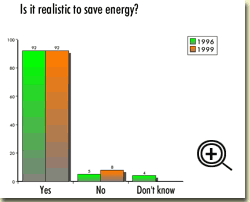 |  |
Nuclear energy is a tricky issue. Many young people regard it as the responsibility of politicians and their parents' generation and they find it hard to understand the result of the 1980 referendum on nuclear energy. Three out of four think that the almost 2 million voters who have arrived since 1980 should be given a chance to express their opinion.
Young people's views on nuclear energy range over a broad spectrum. They make a distinction between Sweden and the rest of the world, between existing nuclear power plants and what is desirable in the long term. There are also great differences between the sexes and reluctance to give clear-cut answers in terms of yes and no. Although the majority says that they know enough about the subject to draw their own conclusions, half the female respondents are not sure that their views are well founded. The male respondents are more confident in this respect: 63 per cent state that they have a definite opinion on the matter. However, some general patterns can be observed.
 |  |
One view is that it is neither realistic nor desirable to phase out nuclear energy in Sweden by 2010. More than 60 per cent of the respondents think that the existing Swedish nuclear power plants should continue to produce electricity until the end of their service life. However, they are less sure about the Barsebck plant, close to both Copenhagen and Malm, often adding that it should be closed "if it doesn't involve extra costs". The other half regards the decision to close the plant as wrong. A majority of the men are for continuing nuclear energy production, while a majority of women are against.
There is a strong desire to develop alternative sources of energy, but phasing out nuclear energy is not considered a necessary condition for this. On the contrary, the respondents are anxious that nuclear energy might be replaced by coal, oil and gas and that in that case more sustainable energy sources would not be given a chance. Those who favor continued nuclear energy production and those who are against express both this fears.
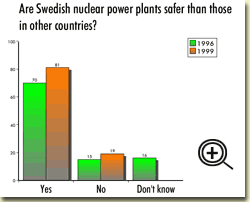 |  |
Whether they are for or against, the respondents consider Swedish nuclear power plants to be safer then those in other countries (90%) and think that Sweden should promote nuclear safety in other countries (89%), by which they generally mean central and eastern Europe. Many (76%) also point out the urgent need for research on safer and more efficient nuclear energy. As regards nuclear waste, there is strong support (70%) for the technique used by the Swedish Nuclear Fuel and Waste Management Co. of disposing of the waste deep in the bedrock. However, half of the respondents state that their home area is not a suitable site for deep bedrock disposal. The usual reason given for this view is "I live in a large city".
 |  |
Young Swedes regard the environment as the most serious threat in the future. Paradoxically, however, the environment is also regarded as the greatest opportunity, since young people today have great faith in technological advances. Many respondents say that research; development and innovation must follow the same trend away from uneconomical use of resources and irresponsibility to environmental awareness and sustainable development. The word responsibility crops up in the interviews time and again. Irresponsibility is rated as the second most serious threat in the future after the environment. It is considered a more serious threat than either war, unemployment or population growth. The reasoning in the in-depth interviews is "I have to take responsibility for my life, so I think the politicians, the business community and other decision-makers should shoulder their responsibility too".
Young people today are globally minded and see opportunities in the ongoing process of change. Combined with their great faith in technological advances and their positive attitude to IT, this sense of global belonging represents an enormous force for the future. Here is a new generation with new values that regards communications as an important tool; for this generation, communication between people and communication on the Net are equally important keys to the coming millennium.
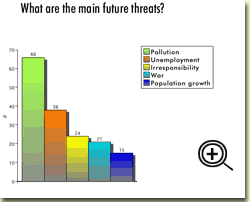 | 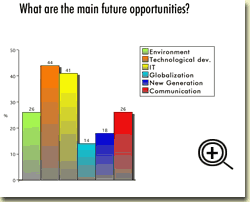 |
This apparently contradictory mix of threats and opportunities explains why young people are so optimistic about the future. But the lack of respect for today's political system is perhaps the greatest problem for the generation that will pass on the baton. It is a "fossil system", to quote a young man, which must be reformed in order to be capable of meeting the quick, but at the same time ultimately correct, decisions that will have to be made in the future by the people's elected representatives.
As mentioned before, young people have much more faith in business than in the political system. Companies, which do not take their responsibility for the market, will not survive. Consumer power is a fact of life for this first genuine media generation. Their values are durable, and it will not be possible to silence or manipulate their ideas, and, above all, these processes are taking place all over the world.
It is thus obvious that we have the attitudes and the values required for ecologically and socially deleterious practices to be transformed and sustained. Barbara Ward has observed that revolutions do not occur until people learn that there is an alternative to their way of life. The young people seems to realize options of alternatives and now slowly the companies joins and a key question will be how fast the consumers and producers will converge their values and cultures into a common good for the future. Or as Walt Wriston so wisely concludes:
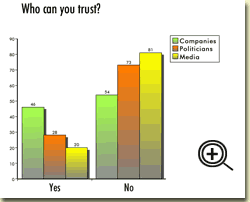 |
"The information economy changes everything from how we make a living to how and by whom the world is run. The competition for the best information is vastly different from the competition for the best bottomlands or the best coalfields. Companies or nations competing for information will be vastly different from those that once competed primarily for material resources"
1 "Tomorrow. Global Environment Business", vol. VIII, Aug 19998, p 10.
2 Jacobs, Michael, "Growth Can Be Green" New Ground Winter/Spring 1989, p 5.
3 Hayward, Tim, Ecological Thought, Polity Press, 1994, p xi.
4 Wriston, Valter, B., "The twilight of Sovereignty. How the information revolution is Transforming Our World" , Replica Books, 1992, xii
5 ibid. s xiii
6 Inglehart, Ronald, "Culture Shift", Princeton, 1990; Hofstede, Geert., "Motivation, Leadership, and Organisation", Organizational Dynamics, summer 1989. Pp42.
7 A Precise selection method was used to ensure that the interviewees constituted a representative sample of young people
8 The results are presented on this website: www.bikupan.se
9 Wriston, W.B., a.a. s 20.
© Bi Puranen 2000

